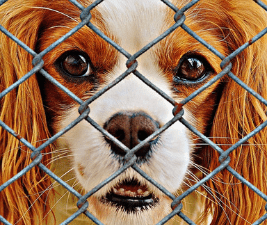Do you feel sorry for your adopted dogs?
At least part of the reason people adopt dogs from shelters or rescues is because they feel sorry for the poor dog. And the absolutely gut-wrenching commercials from the national animal welfare organizations certainly encourage that attitude. Playing on people’s emotions is a major fund-raising tactic.
Laying on the guilt
In the last few years the movement to encourage dog adoption from shelters and rescues has been tremendously successful. It’s changed the way people think about getting dogs. Awareness of puppy mill outlets has even changed laws around the country.
But once an adopted rescue or shelter dog is home, safe with you, that sympathy doesn’t help. We regularly talk to people who tell their dog’s rescue story. While it’s important that we acknowledge the dog’s less-than-perfect history, we can’t let it define the dog. Your adopted dog can never tell you what happened. You’ll never know why your dog does certain things.
What you can do is change your dog’s story. Weighing them down with the past narrative may be holding them back. Your dog’s happiest life is ahead of him/her. Dogs live in the moment and today is their best day ever.
What, not why
One common issue we see with adopted dogs is shyness. It takes a while for the dog to trust a new family. And even longer to feel secure in a new, forever space. But feeling sorry for the dog doesn’t help. Allowing him/her to cower and hide only fortifies the behavior.
Encourage your shy dog to explore new things, talk reassuringly, reward calm and quiet. We know that the emotionally-charged reaction is to “poor baby” the dog and protect him/her. It’s really hard to say “Really? I don’t see anything scary. Let’s go check it out!” when your first instinct is to pick up the dog, cuddle her, and sympathize.
Shy dogs may react fearfully to certain kinds of people (wearing hats, carrying bags, men, children, etc.). And almost everyone says “somebody like that person must have done something bad to him/her.” You won’t ever know if that’s true. That’s not a part of your dog’s story now.
Now is what matters
We’ve been working with a woman who adopted a dog from foreign parts over a year ago. The dog was tremendously shy and barked constantly in class. Anything new or different would set Zoe off. And her barking worked for her. Her mom immediately paid attention. She even encouraged it by speaking sympathetically and petting to calm her down. Zoe had no reason to change – it was working for her.
Changing Zoe’s narrative is working to change her behavior. If there’s nothing to bark at, her rude behavior is ignored. Instead, when she’s quiet, she’s rewarded with treats and attention. She’s learning that she can relax and trust her mom to keep her safe. Whatever Zoe’s past might be, she’s safe now. She has enough to eat, a warm place to sleep, and will never be subject to abuse. That’s her narrative now.
Dangerous tales
In the shop the only dogs who ever bit us were both adopted, shelter dogs. Both of their owners were sympathetic to the dogs’ fears. Despite our best efforts, neither person changed their dog’s story. And neither one ended well. Pity doesn’t help.
In one case, the owner became a virtual recluse because no one could come to her home without being bitten. The behavior worsened with time. The woman herself was unable to put on the dog’s harness and leash, unable to even take the dog on a walk or to the veterinarian. Her dog lives a fear-driven, unhappy life.
The other adopted dog’s owner, sadly, passed away last year. While there were people who cared about the dog, no one was willing to take him – including the organization he was originally adopted from. He was a very cute, vicious Shih Tzu. And his options ran out when his adoptive mother died.
Change your adopted dog’s story
Once your adopted dog is home, the pity should stop. Your dog is now one of the luckiest beings on the planet. They don’t have to fend for themselves. They have food, shelter, and love. And the potential for the biggest, most joyful future. You write your dog’s story. And you have the ability to make it happily ever after.
Want to get updates about dogs? Click here to sign up for the weekly newsletter!















